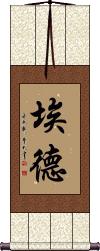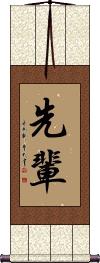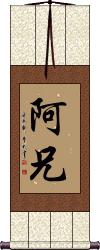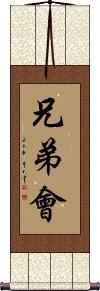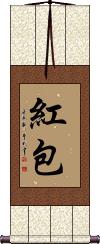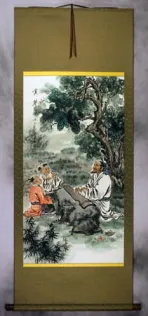Many custom options...
And formats...

Elder in Chinese / Japanese...
Buy an Elder calligraphy wall scroll here!
Personalize your custom “Elder” project by clicking the button next to your favorite “Elder” title below...
Elder
Senpai / The Elder or Master
先輩 is a Chinese, Japanese, and old Korean word or title that means elders, senior (at work or school), superior, older graduate, progenitor, or old-timer.
In American dojos, this is sometimes romanized as Sempai.
Big Brother / Elder Brother
Fraternity
University Brotherhood / House
Red Envelope
紅包 literally means “red treasure.”
Depending on the context, it can also mean “money wrapped in red as a gift,” “a bonus payment,” “a kickback,” or “a bribe.”
However, most of the time, this is an innocent gift of money in a red envelope that is given from an elder relative to a youngster. This usually happens during the Chinese New Year. It can also happen in preparation for or during a wedding in China.
紅包 is pronounced “Hong Bao” (with an “oh” vowel sound on hong) in Mandarin Chinese. Filipino Chinese call it “Ang Pao.” There are a few other variations.
This in-stock artwork might be what you are looking for, and ships right away...
Gallery Price: $286.00
Your Price: $158.88
Not the results for Elder that you were looking for?
Below are some entries from our dictionary that may match your Elder search...
| Characters If shown, 2nd row is Simp. Chinese |
Pronunciation Romanization |
Simple Dictionary Definition |
兄弟 see styles |
xiōng dì xiong1 di4 hsiung ti kyoudai(p); keitei / kyodai(p); kete きょうだい(P); けいてい |
More info & calligraphy: Brothers(1) (See ご兄弟) siblings; brothers and sisters; (2) brothers; (3) siblings-in-law; brothers-in-law; sisters-in-law; (4) (familiar language) (masculine speech) mate; friend; (personal name) Kyōdai Elder and younger brothers; brother, brethren, i. e. members of the fraternity. |
先輩 先辈 see styles |
xiān bèi xian1 bei4 hsien pei senpai せんぱい |
More info & calligraphy: Senpai / The Elder or Master(See 後輩・こうはい) senior (at work or school); superior; elder; older graduate; progenitor; old-timer |
阿兄 see styles |
ā xiōng a1 xiong1 a hsiung akei / ake あけい |
More info & calligraphy: Big Brother / Elder Brotherelder brother; my dear brother |
丈 see styles |
zhàng zhang4 chang masuo ますお |
measure of length, ten Chinese feet (3.3 m); to measure; husband; polite appellation for an older male (particle) (1) (kana only) only; just; merely; simply; no more than; nothing but; alone; (particle) (2) (kana only) as much as; to the extent of; enough to; (given name) Masuo Ten feet; an elder; a wife's parents; a husband. |
伯 see styles |
bó bo2 po haku はく |
father's elder brother; senior; paternal elder uncle; eldest of brothers; respectful form of address; Count, third of five orders of nobility 五等爵位[wu3 deng3 jue2 wei4] (1) count; earl; (2) (hist) (See 神祇官・2) chief official of the Department of Worship (under the ritsuryō system); (3) (abbreviation) (See 伯剌西爾・ブラジル) Brazil; (surname, given name) Haku eldest brother (?) |
兄 see styles |
xiōng xiong1 hsiung kei / ke けい |
elder brother (suffix noun) (familiar language) (See お兄さん・1) older brother; elder brother; (personal name) Kei Elder brother. |
哥 see styles |
gē ge1 ko uta うた |
elder brother (surname) Uta Elder brother. |
姐 see styles |
jiě jie3 chieh ane あね |
older sister (humble language) older sister; elder sister |
姒 see styles |
sì si4 ssu |
wife or senior concubine of husbands older brother (old); elder sister (old) |
嫂 see styles |
sǎo sao3 sao aniyome あによめ |
(bound form) older brother's wife; sister-in-law elder brother's wife; sister-in-law |
嬃 媭 see styles |
xū xu1 hsü |
(dialect) elder sister (old) |
昆 see styles |
kūn kun1 k`un kun kon こん |
descendant; elder brother; a style of Chinese poetry (s,m) Kon |
晜 see styles |
kūn kun1 k`un kun |
descendant; elder brother |
老 see styles |
lǎo lao3 lao rou / ro ろう |
prefix used before the surname of a person or a numeral indicating the order of birth of the children in a family or to indicate affection or familiarity; old (of people); venerable (person); experienced; of long standing; always; all the time; of the past; very; outdated; (of meat etc) tough (n,n-pref,n-suf) (1) old age; age; old people; the old; the aged; senior; elder; (pronoun) (2) (archaism) (humble language) (used by the elderly) I; me; my humble self; (surname) Rou jarā; old, old age. |
芨 see styles |
jí ji2 chi |
Bletilla hyacinthina (mucilaginous); Acronym for the Chinese Elder tree 菫草 |
長 长 see styles |
zhǎng zhang3 chang michi みち |
chief; head; elder; to grow; to develop; to increase; to enhance (1) head; chief; leader; elder; (2) (See 短・1) merit; strong point; (3) superiority; (4) {music} (See 短・2) major; (surname) Michi chang, long; always; zhang, to grow, rising, senior. |
お姉 see styles |
onee おねえ |
(1) (abbreviation) elder sister; (2) (kana only) (slang) effeminate man (often homosexual or transsexual) |
丈人 see styles |
zhàng rén zhang4 ren2 chang jen takehito たけひと |
wife's father (father-in-law); old man (1) (honorific or respectful language) elder; senior; (2) wife's father; father-in-law; (given name) Takehito |
三綱 三纲 see styles |
sān gāng san1 gang1 san kang sankou / sanko さんこう |
{Buddh} three monastic positions with management roles at a temple; (given name) Sankou The three bonds, i.e. directors of a monastery: (a) 上座 sthavira, elder, president; (b) 寺主vihārasvāmin, v. 毘 the abbot who directs the temporal affairs; (c) 維那 karmadāna, v. 羯 who directs the monks. Another meaning: (a) 上座; (b) 維那; (c) 典座 vihārapāla, v. 毘director of worship. The three vary in different countries. |
上坐 see styles |
shàng zuò shang4 zuo4 shang tso Jōza |
elder |
上座 see styles |
shàng zuò shang4 zuo4 shang tso jouza / joza じょうざ |
seat of honor (n,vs,adj-no) chief seat; seat of honor; seat of honour; head of the table; (place-name) Jōza Sthavira; or Mahāsthavira. Old man, or elder; head monk, president, or abbot; the first Buddhist fathers; a title of Mahākāśyapa; also of monks of twenty to forty-nine years standing, as 中座 are from ten to nineteen and 下座 under ten. The 釋氏要覽 divides presiding elders into four classes, those presiding over monasteries, over assemblies of monks, over sects, and laymen presiding over feasts to monks. |
上長 see styles |
kaminaga かみなが |
one's superior; senior; elder; (place-name, surname) Kaminaga |
世母 see styles |
shì mǔ shi4 mu3 shih mu |
wife of father's elder brother (old) |
亡兄 see styles |
boukei / boke ぼうけい |
one's deceased elder brother |
亡姉 see styles |
boushi / boshi ぼうし |
one's late elder sister |
令兄 see styles |
lìng xiōng ling4 xiong1 ling hsiung reikei / reke れいけい |
Your esteemed older brother (honorific) (honorific or respectful language) your elder brother |
令姉 see styles |
reishi / reshi れいし |
(honorific or respectful language) your elder sister |
仲兄 see styles |
chuukei / chuke ちゅうけい |
the younger of two elder brothers |
伯伯 see styles |
bó bo bo2 bo5 po po |
father's elder brother; uncle |
伯母 see styles |
bó mǔ bo2 mu3 po mu uba うば |
wife of father's elder brother; aunt; (polite form of address for a woman who is about the age of one's mother); CL:個|个[ge4] aunt; (surname) Uba |
Click here for more Elder results from our dictionary
The following table may be helpful for those studying Chinese or Japanese...
| Title | Characters | Romaji (Romanized Japanese) | Various forms of Romanized Chinese | |
| Elder | 埃德 | āi dé / ai1 de2 / ai de / aide | ai te / aite | |
| Senpai The Elder or Master | 先輩 先辈 | sen pai / senpai | xiān bèi / xian1 bei4 / xian bei / xianbei | hsien pei / hsienpei |
| Big Brother Elder Brother | 阿兄 | akei | ā xiōng / a1 xiong1 / a xiong / axiong | a hsiung / ahsiung |
| Fraternity | 兄弟會 兄弟会 | xiōng dì huì xiong1 di4 hui4 xiong di hui xiongdihui | hsiung ti hui hsiungtihui |
|
| Red Envelope | 紅包 红包 | hóng bāo / hong2 bao1 / hong bao / hongbao | hung pao / hungpao | |
| In some entries above you will see that characters have different versions above and below a line. In these cases, the characters above the line are Traditional Chinese, while the ones below are Simplified Chinese. | ||||
Successful Chinese Character and Japanese Kanji calligraphy searches within the last few hours...
